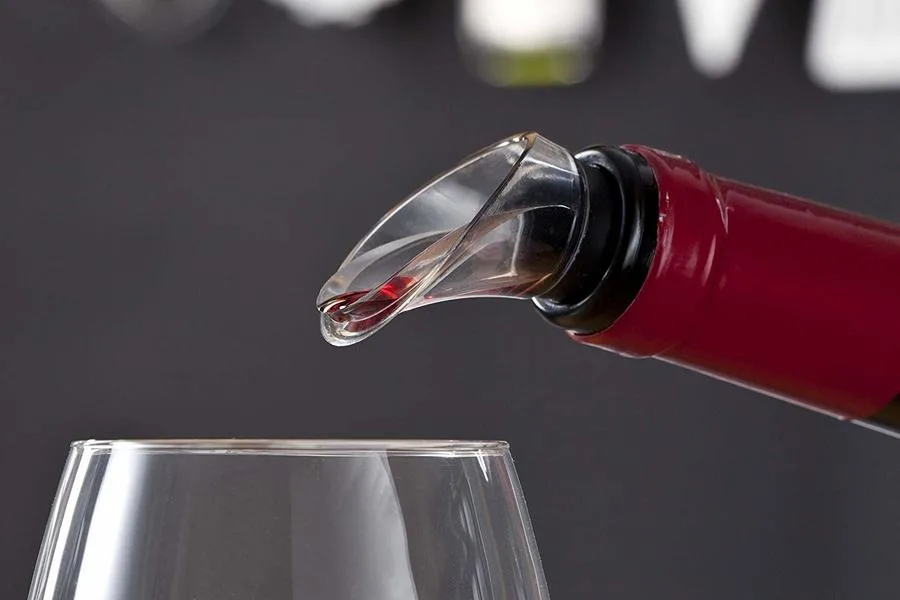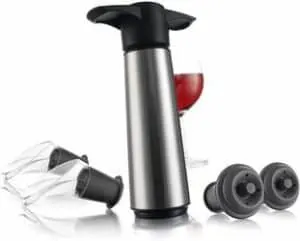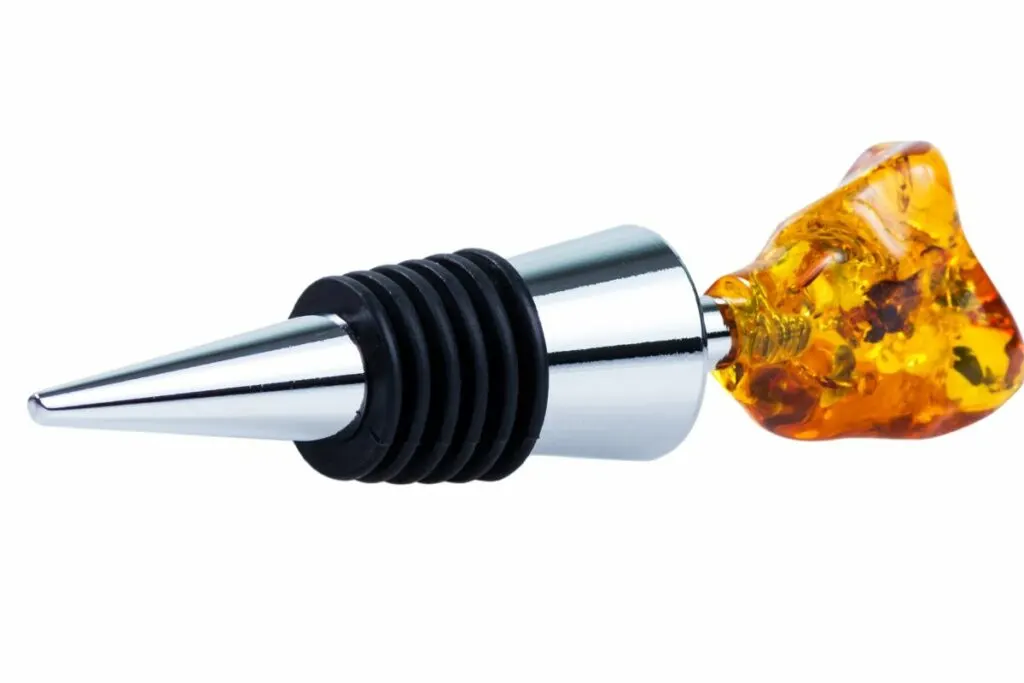As an Amazon Associate, I earn from qualifying purchases with no additional costs for you.
We all love drinking wine, but what do you do when you realize you won’t be able to polish off that bottle of Merlot you opened, and you will have extra? It is a grim realization, and no one wants to come to that conclusion, but it does happen. To the rescue is the wine stopper. Wine stoppers are devices meant to replace the cork of an opened bottle of wine and slow down oxidation. But does it work?
Wine stoppers work well at slowing down the oxidation process from unfinished wine and replacing the original cork in preparation for refrigeration. If you seal a wine stopper on properly, you can generally get an additional week of storage on a bottle of opened wine before oxidation kills it. If you can shove the cork back into the mouth of the bottle, you can accomplish a similar time frame, but wine stoppers are much easier and more widely used.
Wine stoppers are no miracle devices, and they won’t completely stop the oxidation-caused degradation of wine, but they can slow it down a lot. With a well-fitted wine stopper, you can extend the storage life of your wine and drink it later. Let’s take a much closer look at storing opened wine with a wine stopper and why it can be such a smart decision if you can’t get the cork back in.

TIP: If you want to check out the best refrigerator for wine storage, I recommend trying out the Avation (18 bottles) compressor refrigerator with Wi-fi smart app control cooling system. You can find this refrigerator by clicking here (Amazon link).
Wine Stoppers: Preserving Opened Wine
Once you pop the cork, the clock starts ticking. To store opened bottles of wine, you can simply shove the cork back into the bottle, which is much harder than I made it sound, or use a good wine stopper to seal off the outside world.
A wine stopper won’t stop the oxidation process, but it will slow it down some. Before refrigeration, I would recommend applying a good wine stopper to the bottle, and you’ll get a few extra days of good wine.
Best Wine Stopper

The Vacu Vin Original is the best wine stopper on the market in my opinion. These things are very inexpensive compared to much pricier options but effectively remove all oxygen inside which delays the oxidation process and keeps your wine robust for much longer. This vacuum-sealing stopper uses a manual pump that you will use to suck out the oxygen protecting your wine from its harmful effects.
There are so many wine stoppers on the market but the one I trust and so many other serious wine drinkers trust is this one. I’m not going to guide you down the wrong path and have you spend way more money than you need. Forget all the rest and go with this one. You can get one for under $20 and it will be as effective as something 4 times that much.
Check out Vacu Vin on Amazon
Types of Wine Stoppers
Generally speaking, there are 3 types of wine stoppers. The 3 categories are decorative stoppers, pouring stoppers, and vacuum-sealing stoppers.
Decorative Stoppers
These stoppers are usually made to resemble a cork and are typically made of some type of rubberized surface designed to seal tightly with the neck of the wine bottle.
These often feature a decorative pull that can be personalized. The pull is designed to remove the device from the bottle when ready to pour.
These types of wine stoppers make great gifts because they are so decorative and because they are inexpensive. As far as effectiveness goes, they do provide a nice seal but some oxidation will still occur.
Generally speaking, you can extend the life of your wine an extra day or two using these wine stops. These types of wine stoppers are the most affordable but least effective options for storing opened bottles of wine.
Pouring Stoppers
Pouring wine stoppers are designed to seal tightly with the bottle and have a small opening or spout by which you can pour wine when you are ready to drink some more.
These wine stoppers are typically made of metal or plastic and cost more than cheaper decorative wine stoppers. As far as effectiveness in extending the storage life of wine goes, they are comparable to decorative wine stoppers.
They can extend the life an additional day or two but they have the added benefit of being able to pour out wine so you won’t have to remove the wine stop until you are throwing your empty bottle away.
Vacuum-Sealed Wine Stoppers
These are the high-quality options out there. These types of wine stoppers are designed to use battery power or manual pumping to suck oxygen from inside the bottle harmlessly away from the wine. While these types of stoppers may lack in elegant design, they make up for in sheer practicality.
They are more expensive than decorative or pouring stoppers but they are much more effective at slowing the oxidation process. Using a quality vacuum-sealed wine stopper, you can extend the life of your opened wine up to a week.
TIP: Do you know you can also use wine stoppers to seal Prosecco after it has been opened? Read all about it in my article on the topic. If you don’t have a wine stopper or a cork, find out how to save your wine by reading this article.
Recommendation box: Everything you need to enjoy your wine as much as possible. All recommended products are personally tested and regularly used by experts from this website (Amazon links):
> Ivation Wine Cooler – Energy-efficient wine cooler for 18 bottles with Wi-fi smart app control cooling system.
> Wine Rack – Beautiful, elegant wood rack for up to 7 bottles and the choice of vertical or horizontal storage.
> Durand Wine Opener – Classic vintage wine opener (we like all these classic staff).
> YouYah Iceberg Wine Decanter – The most beautiful and handy wine decanter we personally use.
> Bormioli Rocco Wine Glasses – A set of eight elegant and traditional wine glasses made in Italy.
> Vintorio Wine Aerator – Simple but really useful wine aerator for a reasonable price.
> The Original Vacu Vin Wine Saver – The best wine saver on the market in a package with two vacuum stoppers and two wine servers.
And if you want to become a true connoisseur of wine, we recommend reading the book Wine Folly: The Essential Guide to Wine (Amazon link), where you will find all the information you need about winemaking, wine varieties, flavors, and much more.
How Long Does Wine Last With A Wine Stopper?

If you use a quality wine stopper, wine can last 5-7 days in a refrigerator just fine which will extend its life and make it possible to still enjoy quality wine days after popping the cork. It should be noted that because of the oxidation process, after a couple of days, your wine will undergo so character changes that will get more noticeable as that seventh day nears.
Long-Term vs. Short-Term Use
For short-term wine storage, a wine stopper is ideal. When I say short-term, I’m referring to a time frame under a week after popping the cork. The oxidation process will slow some if you put on a quality win stopper but it won’t stop it. Every day that passes after you pop the cork, your wine will soften and round out.
Many people like their wine this way, whereas others prefer their wine fresher. After about a week with the wine stopper, your wine will taste flat or off. It will no longer carry that same robustness of flavor and notes.
If you plan on finishing the bottle within a few days of opening, a wine stopper is perfect for you. I would not recommend storing wine longer than a week after you pop the cork.
There isn’t a wine stopper on the market that can stop the oxidation process well enough to preserve wine this long. Before you open that next bottle of wine, make sure you can finish it off within a week.
If not, it will go to waste. It simply won’t be worth drinking after that long, and it doesn’t matter how expensive your wine stopper or how much care you put into preserving it.
TIP: Love your red wine, but you don’t know how to store it safely? This article explains how to store red wine until you are ready to drink it. Read my complete guide on long-term wine storage for extra tips.
What Do Wine Stoppers Do?
Wine stoppers are essentially small devices that are used to close leftover wine bottles before refrigeration. Standard wine corks can be very hard to put back into the mouth of the bottle, so to compensate, specialized wine stoppers have been developed to act as that temporary seal to slow down the process of oxidation, which inevitably will kill your wine.
If you can’t put the original cork back into the mouth of the bottle, a wine stopper can functionally take its place and seal off the bottle from outside elements and prevent oxygen from entering.
If you can’t finish the bottle of wine you opened and can’t plunge the original cork back in well enough, a wine stopper can be a great tool to extend the life of your wine for a few extra days. Beyond a week, your wine won’t be any good.
TIP: Are you interested in buying a wine stopper? We’ve personally tried and recommend buying one of these wine stoppers (Amazon links):
- The Original Vacu Vin Wine Saver: Our top choice. Very easy-to-use wine stopper/saver. You can enjoy a glass of fresh wine whenever you want without worrying about wasting any.
- EZBASICS Wine Saver: Great alternative to Original Vacu Vin Saver. This wine stopper keeps the flavor of wine for up to one week.
- Champagne Stopper by MiTBA: Wine stoppers for sparkling wines are different. This wine stopper seals your bottle and increases the pressure so your beverage’s bubbles won’t go to waste.
So Do Wine Stoppers Work?

Wine stoppers do work well and are certainly better than nothing. Wine stoppers will not completely stall the oxidation process, which ruins wine, but it will at least slow it down.
You may get an additional day or two out of your wine if you are using cheaper pouring or decorative wine stoppers and as much as a full week if you invest in a vacuum-sealed wine stopper that sucks out all of the oxygen from the bottle.
The bottom line is as soon as you pop the cork on your wine, the clock starts ticking. Adding a good wine stopper won’t stop the clock but it will slow down how quickly the time ticks off.
Some people try to shove the original cork back in but this is tough and can cause the wine to crack, releasing a steady stream of oxygen into the wine. A wine stopper isn’t perfect, but it is a heck of a lot better for the job and will help extend the life of your wine.
A study by Jacob & Neal (2011) found that wine stoppers do work but storing wine in cooler temperatures did more saving open wine. A study by Mas & colleagues (2006) also yielded interesting results.
Are Wine Stoppers Needed?
If you have not finished your bottle of wine, don’t sweat it. You can still preserve the bottle for a couple of extra days without much fuss.
A wine stopper is the most efficient way to save your extra wine, but it isn’t the only way. If you can manage it, shoving your cork back into the bottle’s mouth can work about as well as a wine stopper.
Neither option is ideal, and the cork re-insertion can be challenging and unreliable. The wine stopper will always be easier and more effective.
You do not need a wine stopper, but they will sure make your life a lot easier. If you can polish off a bottle in one sitting, do it. If you are having company over and can finish the bottle, you are good.
Neither a wine stopper nor reapplying your original cork will save the wine from the effects of oxidation. You may give your bottle of wine an extra week at the most, but that is still better than not getting that time. A wine stopper is not required, but it certainly does help.
TIP: If you use a decanter for your wine, you may wonder whether your decanter needs a wine stopper. Take a look at my article on the topic for some pro tips. Read this article for some great ideas on how to store wine, whether the bottle is opened or unopened.
Concluding Thoughts
A wine stopper is something worth investing in if you enjoy wine. You may not use it every time you drink wine, but you will certainly get plenty of run out of it.
A wine stopper can not stop the oxidation process completely, and your wine will ultimately start degrading once the cork is popped, but it can make a world of difference in wine flavor and quality a day or so later.
Decorative and pouring wine stoppers can give you an additional couple of days, whereas a high-quality vacuum-sealed wine stopper can give you up to a week.
It should be noted that even with the highest quality wine stopper, your wine will undergo some character changes within about 3-4 days after the cork is popped. Wine will usually round out and become softer after it oxidizes.
TIP: Check out this page for a complete list of wine products and accessories I love. You’ll find my recommendations for wine refrigerators, decanters, and aerators and the best place to buy wine online. Click here to see the complete listing.
Scientific Literature Referenced:
Jacob, D. J., & Neal, J. A. (2011). Efficacy of Preservation Methods Used for Wine by the Glass Programs in Restaurants. Journal of Culinary Science & Technology, 9(4), 212-227. DOI:10.1080/15428052.2011.627234 (via: Taylor & Francis)
Mas, A., Puig, J., Lladoa, N., & Zamora, F. (2002). Sealing and Storage Position Effects on Wine Evolution. Journal of Food Science, 67(4), 1374-1378. DOI:10.1111/j.1365-2621.2002.tb10292.x (via Wiley)
